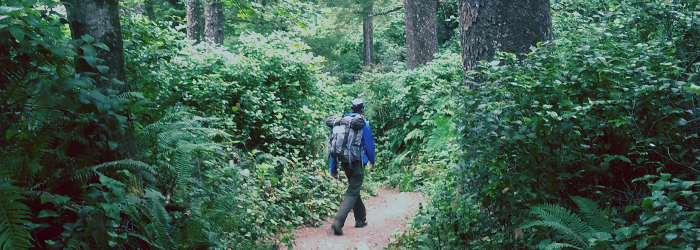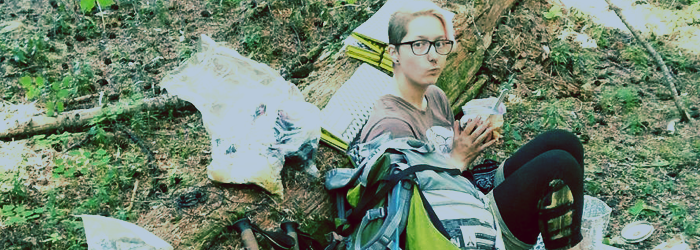The sun is just starting to touch the tips of the trees, and today’s hike is starting to weigh you down; much like that 30lb pack on your shoulders. There’s a new hole in your shoe and every so often you’ve been shaking pine needles and dust out from between your toes. It rained that morning, and that afternoon was warm, leaving the trail muggy and hot. Your head hurts a little. The last day hiker you saw didn’t say hi or even make eye contact. Today’s been a pretty meh day.
The taste of the last Clif bar you ate still lingers in your mouth, or was it a Snickers? You don’t remember, as eating constantly has become a habit that you aren’t even giving the food second thought anymore. Food is no longer food, it’s fuel.
A quick mental calculation and you figure you’re less than a mile to your proposed campsite for the night. You’re not completely exhausted and may even have some time to wind down before snuggling up in your sleeping bag with your pillow made of balled up clothing in a sack. Maybe tonight you will pull out your stove and prepare one of your dehydrated dinners. Maybe ramen? Do you still have that curried rice? No, you ate that two days ago. Your stomach rumbles. The lentil stew that’s been sitting at the bottom of your food bag for a few resupplies suddenly doesn’t sound so bad.

Later that evening, when the sound of your footsteps and breathing has been replaced with crickets and the occasional hooting owl, you check your watch and uncover your warm pot. Savory steam with hints of bay and cumin tickles your nose, and you barely take a breath before shoveling the brown gruel into your mouth. The hot food fills your gut and warms you from the inside out and relaxes you like a hot bath. Maybe today wasn’t that bad. Things went pretty well actually. Your mood improves, and you curl up under the stars ready to get up tomorrow and do it all again.
Food is important. To expend energy you must consume energy. Backpacking requires a lot of energy, so lots of food is critical; around 5,000 calories a day. In the front country, 5,000 calories could be easily consumed. In fact, one could meet that goal by eating a Big Mac meal for breakfast, lunch, and dinner, a McFlurry for dessert, and grazing on other simple carbs throughout the day. But try carrying all of that on your back, and then try carrying 5 days worth of it on your back. Food is heavy. Calories are heavy. When planning fuel for hiking excursions, careful consideration must be made to what you are taking with you. The more food you carry, the more calories you burn to carry that weight, resulting in the need for more calories. A balance must be made.
On top of that, eating the same food every day over the course of a week or longer is very boring. When your spirits are dwindling and your body is hurting, a surprisingly delicious, or soothing comfort food, can change your day. A special chocolate bar after you climbed an especially difficult pass serves better as a mood booster and reward than the same cliff bar you had for breakfast.

Hunger will also affect everything about your day, and if your food choices were poor you’re going to have a bad time. Food deprivation leaves you distressed and distracted, disrupts blood sugar control (leading to headaches, mood swings, trembling, sweating, and fatigue; on top of your already established sweating and fatigue from exercise). It can also cause brain fog; poor memory and attentiveness, which in the wilderness can lead to absolute disaster. You could forget gear on a stump after taking a break, miss a turn, or become lost. Eating poorly consistently as some do on long-distance hikes can lead to nutrient deficiencies. Iron is essential for carrying oxygen through your body and to the muscles you abuse every day. Vitamin C is vital to iron absorption and is important to healing wounds. Vitamin A is also used in wound repair and fights inflammation as well. Calcium helps to move nutrients around your body, and etc etc etc. I’m sure most of you took a health class at some point in your academic career.
To get to the point, food is important both physically & mentally and therefore is even more important to hikers. Most of you reading this probably already know this, so I applaud you getting this far.
Beyond simple nutrients, the food of my upcoming PCT thru-hike has been my obsession. I’ve spent more time working on my food resupply than anything else. I love to cook, this is an established fact. I also love prep work. I must have put at least 130+ hours into our resupply strategy, including dehydrating and preparing various foods. I came up with 15 different meals and made 10 each. The likelihood of eating something more than once in a 7-day stretch is rather slim.

Coming up next: My favorite backpacking foods, my least favorite, and some recipes!